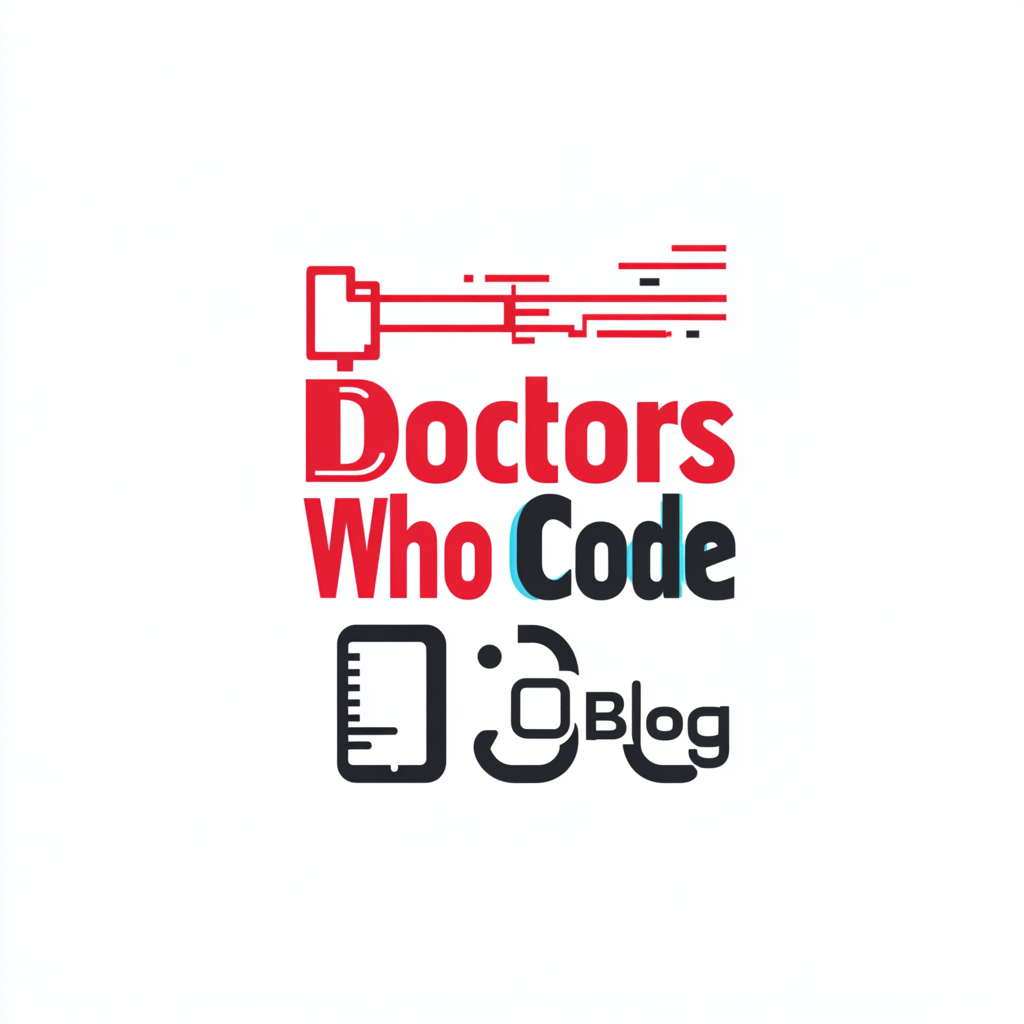DEEP DIVE PODCAST
The Scalpel and the Algorithm – A New Era for Physicians
In today’s data-driven healthcare landscape, physicians who understand both medicine and code are becoming the new pioneers of patient care. Imagine diagnosing complex diseases with AI algorithms you’ve personally fine-tuned to your clinical practice, or building the next breakthrough medical app that transforms patient outcomes. As healthcare technology evolves at unprecedented speeds, doctors who code aren’t just keeping pace—they’re leading the revolution.
The intersection of medicine and technology is no longer a distant frontier—it’s the new battleground where healthcare’s most significant challenges are being conquered. AI-powered solutions are redefining what’s possible in disease detection, treatment planning, and patient monitoring. But who better to guide this transformation than those who understand the nuances of clinical practice and the power of programming?
Welcome to Doctors Who Code – Your Journey to Innovation
Welcome to the Doctors Who Code Blog, a community created by physicians for physicians who are curious about the transformative potential of combining clinical expertise with coding skills. We believe that doctors bring an invaluable perspective to healthcare technology development—one that can’t be replicated by technologists alone.
This blog exists to support your journey, whether you’re just beginning to explore the concept of medical coding or you’re already developing your own healthcare applications. We’re here to inspire, educate, and connect physicians who recognize that the future of medicine will be shaped by those who can speak both the language of healing and the language of technology.
How AI is Revolutionizing Healthcare
The healthcare industry is experiencing a fundamental transformation powered by artificial intelligence. This isn’t incremental change—it’s a revolution that’s reshaping every aspect of how we prevent, diagnose, and treat disease.
Diagnostics and Imaging
AI algorithms can now detect patterns in medical images that even experienced radiologists might miss. Deep learning systems are identifying early signs of breast cancer in mammograms, spotting minute cerebral hemorrhages in brain scans, and flagging potential COVID-19 cases from chest X-rays—often with accuracy that meets or exceeds human specialists.
Clinical Decision Support Systems powered by AI are analyzing thousands of data points in electronic health records to flag patients at risk, recommend diagnostic tests, and suggest treatment options based on the latest evidence and patient-specific factors.
Personalized and Precision Medicine
The promise of truly personalized medicine is being realized through AI’s ability to analyze vast datasets of genetic, physiological, and environmental information. These systems can identify which treatments will work best for specific patient subgroups, predict adverse reactions before they occur, and recommend preventative measures tailored to individual risk profiles.
Drug Discovery and Development
The traditionally lengthy process of drug discovery has been dramatically accelerated with AI. Machine learning algorithms can screen millions of potential compounds, predict their properties, and identify promising candidates for further investigation. This not only reduces the time to market for new medications but also decreases development costs while increasing success rates.
Patient Monitoring and Telemedicine
The COVID-19 pandemic highlighted the critical importance of remote healthcare delivery. AI-powered monitoring systems and telemedicine platforms are enabling continuous tracking of patient vitals outside clinical settings. From smartwatches that detect irregular heart rhythms to home monitoring systems that track disease progression, these technologies are extending the reach of medicine beyond hospital walls.
Surgical Procedures and Robotics
Robotic surgical systems like the da Vinci are revolutionizing minimally invasive procedures. These systems, enhanced with AI capabilities, provide surgeons with unprecedented precision, control, and visualization. The next generation of surgical robots will incorporate real-time guidance, autonomous functions for routine tasks, and predictive analytics to minimize complications.
Hospital Operations and Efficiency
Behind the scenes, AI is optimizing hospital workflows, predicting patient admissions, managing supply chains, and improving resource allocation. These operational improvements translate directly to better patient care, reduced costs, and more sustainable healthcare systems.
Behavioral Health Therapies
Digital therapeutics, including AI chatbots and virtual therapists, are expanding access to mental health interventions. These tools provide evidence-based cognitive behavioral therapy techniques, meditation guidance, and other psychological support services to patients who might otherwise go untreated.
Medical Training and Education
Medical education is being transformed through AI-powered simulations, virtual reality training environments, and adaptive learning systems. These technologies allow medical students and practicing physicians to gain experience with rare conditions, practice complex procedures, and receive personalized education tailored to their learning needs.
Why Should a Doctor Learn to Code? Embracing the Power of “Doctor-Coder”
As physicians, we’ve spent years mastering the art and science of medicine. Why, then, should we invest additional time and energy into learning to code? The answer lies in the unprecedented opportunities this combination of skills creates:
Become an Active Participant in the AI Revolution
When doctors understand coding, they’re no longer passive consumers of technology—they become active creators. Rather than waiting for engineers to build tools that may or may not address real clinical needs, physician-coders can develop solutions specifically designed for the challenges they encounter daily.
Bridge the Gap Between Medicine and Technology
There’s often a significant communication gap between healthcare providers and technology developers. Doctors who code can serve as translators, ensuring that technical solutions truly address clinical requirements. This “bilingual” ability facilitates more effective collaboration and leads to better outcomes.
Develop a Deeper Understanding of Healthcare Data
Modern medicine generates enormous amounts of data, but extracting meaningful insights requires both clinical knowledge and technical skill. Doctor-coders can directly analyze this data (while respecting privacy regulations), uncovering patterns that might otherwise remain hidden and converting those insights into improved patient care.
Drive Innovation and Solve Real-World Clinical Problems
Every physician has encountered workflows, devices, or systems that could be improved. With coding skills, you can move beyond identifying these problems to actually solving them. Whether it’s creating a simple script to automate a tedious documentation task or developing a complex algorithm to predict disease progression, your clinical perspective combined with technical abilities makes you uniquely qualified to innovate.
Enhance Critical Thinking and Problem-Solving Skills
Coding and medicine share a foundation in logical thinking and systematic problem-solving. Learning to program enhances these cognitive skills, which translate back to improved clinical reasoning. The structured approach required for writing good code can refine how you approach diagnostic challenges and treatment decisions.
Future-Proof Your Career
As AI and technology become increasingly central to healthcare delivery, physicians with technical skills will be positioned at the forefront of medicine’s evolution. Whether you’re interested in research, clinical practice, administration, or entrepreneurship, coding abilities will differentiate you and open doors to exciting opportunities.
The Bright Future of AI in Healthcare – Opportunities for Doctor-Coders
The integration of AI into healthcare is just beginning. Here are some emerging areas where physicians with coding skills can make significant contributions:
Edge AI and Federated Learning
As concerns about data privacy grow, techniques that allow AI models to be trained without centralizing sensitive information are becoming increasingly important. Edge AI moves computation to local devices, while federated learning enables model training across distributed datasets without sharing the raw data. Doctor-coders can help develop privacy-preserving AI applications that protect patient information while delivering powerful insights.
Reinforcement Learning in Clinical Decision Making
Reinforcement learning—a type of AI that learns through trial and error with a reward system—holds tremendous potential for developing adaptive treatment protocols. Physicians who understand both the clinical nuances of treatment decisions and the technical aspects of reinforcement learning algorithms are ideally positioned to advance this field.
AI in Genomics and Precision Medicine
The integration of genomic data into clinical decision-making represents one of medicine’s greatest opportunities and challenges. The complexity and volume of genomic information make AI assistance essential, but effective implementation requires both biological understanding and technical expertise—a perfect opportunity for doctor-coders.
Early Disease Detection
Subtle patterns that precede disease onset often exist in patient data long before clinical symptoms appear. AI systems can detect these patterns, enabling earlier intervention and better outcomes. However, developing and validating these predictive models requires both clinical insight and technical skill—the doctor-coder’s unique combination.
Improving Algorithm Transparency and Addressing Bias
As AI becomes more integrated into healthcare decisions, ensuring these systems are transparent, explainable, and free from harmful biases is essential. Physicians with coding knowledge can contribute to developing Explainable AI (XAI) approaches and implement methods to detect and mitigate algorithmic bias that could affect patient care.
Seamless Integration of AI into Clinical Workflows
For AI to deliver on its promise, it must integrate smoothly into existing clinical workflows rather than adding complexity. Doctor-coders, with their firsthand experience of clinical environments, can design AI systems that enhance rather than disrupt patient care.
You Already Have What It Takes – Embracing the Learning Journey
If you’re a physician considering learning to code, you might feel intimidated by the prospect of mastering a new field. But as a doctor, you already possess many of the skills and traits that make for excellent programmers:
Analytical Thinking
Medical diagnosis requires gathering information, identifying patterns, and systematically eliminating possibilities—precisely the same cognitive process needed for debugging code or designing algorithms.
Problem-Solving
Every day, physicians solve complex problems with multiple interacting variables and constraints. This ability translates directly to the challenges of software development.
Attention to Detail
In medicine, small details can have life-or-death consequences. This meticulous attention carries over to coding, where a single character out of place can change a program’s entire function.
Continuous Learning
Medicine demands lifelong learning as research advances and guidelines evolve. This habit of continuous education serves you well as you enter the ever-changing field of technology.
The journey from physician to physician-coder is not about abandoning your medical expertise but about augmenting it with new capabilities. Start small, be patient with yourself, and remember that every expert was once a beginner.
Join the Movement!
The future of healthcare will be shaped by those who understand both the human aspects of medicine and the technical possibilities of code. As a physician, you have unique insights into healthcare’s challenges and opportunities. By adding programming skills to your toolkit, you can translate those insights into solutions that improve patient care, advance medical science, and transform healthcare delivery.
Ready to embark on this exciting journey? Subscribe to the Doctors Who Code Blog to receive the latest insights, tutorials, and inspiring stories from fellow physician-coders. In the coming weeks, we’ll be sharing beginner-friendly guides to programming languages particularly suited for healthcare applications, ideas for starter projects that address real clinical needs, and interviews with doctors who have successfully integrated coding into their medical careers.
Share this post with colleagues who might be interested in exploring the intersection of medicine and technology. Together, we can build a community of physician innovators who leverage the power of code to fulfill medicine’s fundamental mission: improving and saving lives.
What aspect of coding for healthcare are you most interested in exploring? Share your thoughts in the comments below!
About the Author: Dr. Chukwuma Onyeije is a practicing physician and self-taught programmer who believes in the transformative potential of doctors who code. After experiencing firsthand the limitations of healthcare technology designed without clinical input, he committed to bridging the gap between medicine and programming. He founded the Doctors Who Code Blog to support other physicians on their coding journey.

